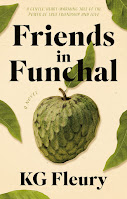I received this book for free from Netgalley. That did not influence this review.
Friends in Funchal by K.G. Fleury is an oddly beautiful book, set in Funchal on the island of Madeira in 1812.
Robert Willan is a middle-aged British physician (dermatologist) and a Quaker. He’s in failing health due to tuberculosis. He comes to Funchal for the balmy weather of the mountains and is cared for in a hostel of some sort called Quinta do Til. He is at first the only patient there, but when he learns of a young man staying nearby who is also afflicted with TB and who would also benefit from the care at Quinta do Til, he agrees to share the manor house with him. (It’s unclear how he found this hostel and who is paying for it all.) The young man is named Bennett, and he is accompanied by a healthy brother, Ashby, who looks after him.
The manor is run by two men, Jorge and Duarte, and one woman, the cook/housekeeper who rules the roost, Dona Esmerelda. There is also a neighbor, Senhor Pompion, who befriends Willan.
The novel is based on true historical figures and the depth of the descriptions makes it all feel very real.
So, here’s the thing. It’s very slow. And the prose, particularly the dialogues, is somewhat stilted. The novel walks us through the minutiae of Willan’s days. Because of his illness, he isn’t able to do much. He obsesses over his health, of course. And being a physician, he keeps very careful track of each change. Because one of the most severe manifestations of his particular TB course is diarrhea, the reader is treated to his daily analysis of the quality and quantity of his bowel movements, which takes some getting used to. The highlight of his days is mealtimes, particularly the varied soups prepared by Dona Esmerelda – so, not much action in the plot.
Willan is somewhat obsessive-compulsive. In addition to his health records, he tracks daily weather conditions. He enjoys looking down at the harbor through a telescope and tries counting the boats. He’s very particular about the arrangement of his room and his papers. (He’s compiling his research on dermatological diseases.)
Madeira is a foreign country to him. He doesn’t know the language and is unfamiliar with its fruits, vegetables, and vegetation. He slowly learns, and finds learning new things delightful. He also makes time to check in daily with God.
Mostly though, he makes friends with the kind and generous people in his small sphere, and this is the true progression of the plot – the interactions of Willan with the men around him. He slowly develops a sense of humor, something he has always lacked, partly fearing that God disapproves of levity.
This is all very sweet, but it’s one of the “quietest” books I’ve ever read.
All along, Willan looks forward to regaining his health. (As does poor young Bennett.) They are both attended to by a local doctor who specializes in the treatment of tuberculosis. Early on, the doctor prescribes laudanum to Willan and his increasing dependence on the drug seemed, for a while, to be worrisome. Some days Willan feels he’s getting better. Other days, it’s clear his disease is progressing. The doctor adds other early-nineteenth-century drugs to Willan’s regimen. I found myself growing more and more engrossed in the state of Willan’s health.
And then, we come to the last 10-20% of the book and I find I can’t put it down. Is Willan going to make it?
It’s then that I realize I’m reading a book about a man slowly, slowly dying of tuberculosis. And all the minutiae of his days, his appreciation of newfound friendships, his hyperfocus on the little things: the taste of food, birdsong, lizards on trees, the scent of banana trees – it all takes on a brittle, beautiful poignancy.
It’s hard to recommend this book because, although fairly short, it requires a good deal of patience. And yet, I do recommend it because the ending is exquisite.














So glad that there was a good payoff for reading this book! It does sound like an interesting and unusual setting.
ReplyDelete